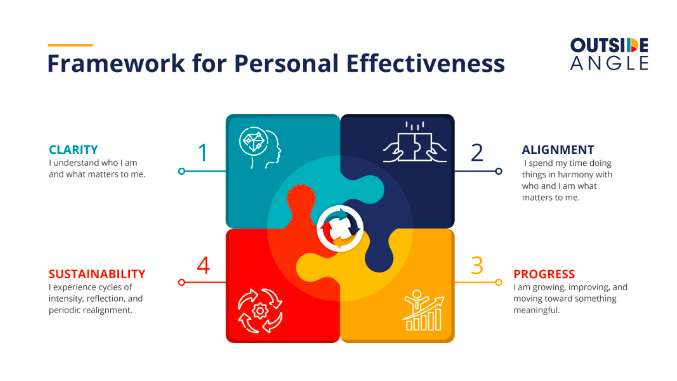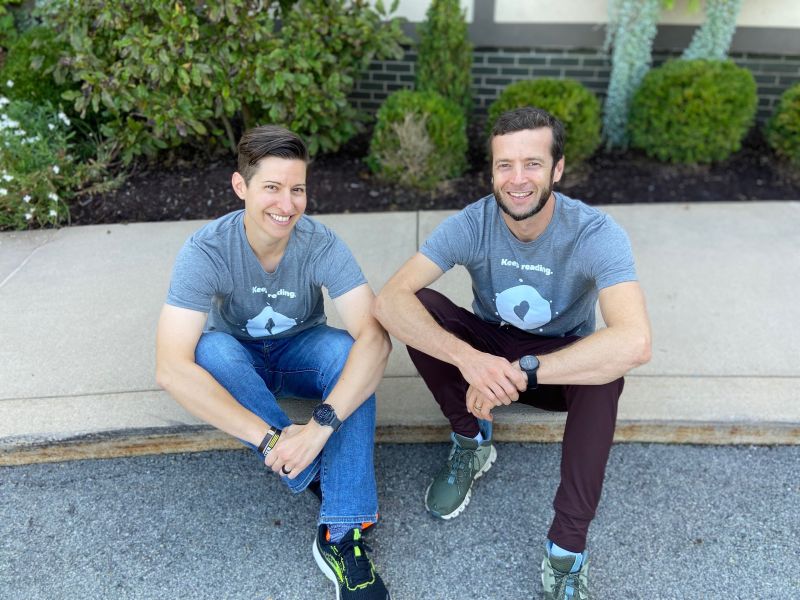Sometimes the work we need to do gets put off by the work we think we should be doing. We think we should be doing the things on our ‘To Do’ lists and on our plates by default, not to mention the things thrust upon us by the urgency of others. Over time, that mindset catches up with us. We find ourselves overwhelmed with commitments and finding much less joy in our work than we once did.
In these moments, there’s something we can do: step back, reflect, and focus on our own personal effectiveness.
Focusing on Personal Effectiveness
In recent months, we’ve reflected on what it takes to show up and keep doing the work while also tuning into the signal and symptoms that something needs to change. That cycle of reflection led us to evolve our thinking about how we support organizations through change and help them become antifragile in the face of constant change. Our approach centers on rethinking what change means and how to navigate it. Importantly, it also requires centering the people who will constantly navigate that change.
People need to be anchored somewhere if they’re going through change and uncertainty. A clear vision for where the organization is going is critical if process must be open to evolution. The same turns out to be true for individuals.
Expanding on our organizational change work, we recently spent some time thinking deeply about what individuals need to be successful. From this research and our own experiences, we identified four things people need to strengthen their own personal effectiveness.
1. You Need a Personal Vision
People need clarity about who they are and what they care about. Moreover, they need to regularly be in touch with those things so that they experience work (and life in general) as a meaningful journey rather than feeling surprised, disappointed, and even confused when they realize they don’t really know what matters most to them.
Ignoring your intuition and the signals you get from your day to day work over time is like following a compass that is off by one degree. Initially, it won’t be obvious—but over a little time, you’ll be miles off course.
Developing a personal vision doesn’t have to be an extensive process—although it can be. Taking plenty of time to re-evaluate might be worth it if you truly do lack clarity. (We love the growing trend of sabbaticals for this reason.) That said, even brief reflection exercises on when you are most likely to enjoy your work, what value you tend to bring to your relationships, and when you are most focused and engaged will point the way toward who you are and what you care most about.
2. Your Work Must Align to Who You Are
Gallup has been reporting for a long time that employee engagement is abysmally low. It’s a disappointing fact that most people represented by their research are not thriving at work. It’s disappointing from the perspective of humanity; at a time when we have the fewest impediments to our health and happiness, we are least likely to actually be healthy and happy.
We hypothesize that the reason so many people are not engaged at work is a shared responsibility of people and their employers. People are not in roles that align with who they are and what they care about, and employers are not doing the work to help people spend most of their time doing things that align with their personal vision. Not everything we do will be what we want to be doing; but alignment means that the work you do is moving you toward your personal vision and function consistently with your beliefs and values.
3. You Need to Feel Progress
One thing that management research continues to demonstrate is that progress being equal to promotion is a big problem in today’s workplaces. People need to feel a sense of progress in the form of growth and development. Sometimes that means they will move to new roles. Sometimes if might mean that being the best at their current role is the most valuable path for them and their organization. Either way, the feeling of progress is essential.
People who feel no sense of progress will become increasingly disengaged because they aren’t being challenged. Progress doesn’t have to happen in giant leaps. In fact, progress will more likely follow a predictable path of a slow start followed by a sharp period of continuous improvement followed by a plateau or dip, and then another period of prolonged improvements and another plateau. The number of growth periods and plateaus depends on motivation to continue through periods of challenge. If you want to experience progress, work hardest through your periods of challenge to get to the next period of improvement.
4. You Need to Endure
People need to approach their efforts in work and otherwise from the perspective of sustainability. Many people describe periods of burnout in which they lack motivation or focus or feel disconnected or anxious. That can come from a lack of clarity or alignment, but it can also come from constantly pursuing progress without making intentional time to step back, slow down, and reflect. Ask yourself, what is giving you energy and what is sapping your energy?
Reflection and renewal aren’t optional or lazy. They are as important as periods of intensity and of working through hard challenges. Everyone needs a sustainability strategy because ongoing effectiveness benefits from it—and because it can be difficult to recover from burnout.
The Personal Effectiveness Framework
To bring all of this together, we developed a simple Personal Effectiveness Framework that helps anchor us in what we need to be doing to care for and manage ourselves. The framework can be helpful to leaders as a tool for helping our teammates achieve optimal engagement in their work as well. The framework includes Clarity, Alignment, Progress, and Sustainability (CAPS).
We’ll be digging into each of these domains much more in future posts, but we hope you’ll begin by reflecting on where you fall within each one.

Personal Effectiveness is A Journey
Personal effectiveness isn’t something one achieves; it’s something one is constantly striving to achieve. While we tend to believe that people don’t change, the reality is that we all change all the time. Our effort should be to understand those changes and integrate them into how we understand ourselves and each other so we can be effective in creating the impact we want to see in the world around us.

